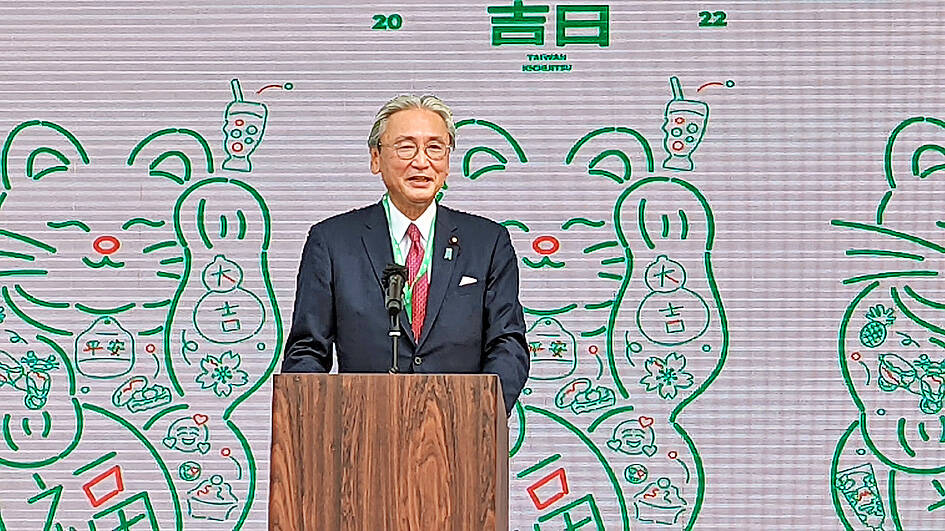Tokyo Governor Yuriko Koike on Saturday sent her regards to President Tsai Ing-wen (蔡英文) and expressed the hope for closer ties between Tokyo and Taiwan at the opening of a Taiwanese culture festival.
The two-day Taiwan Plus festival opened at Tokyo’s Ueno Park on Saturday morning. Koike did not attend the opening ceremony in person due to a scheduling conflict and a statement she prepared was read at the event instead.
In the statement, Koike thanked the organizers of the event promoting Taiwanese culture and sent her best wishes to Tsai and Taiwan.

Photo: Lin Tsuei-yi, Taipei Times
Koike previously attended the event three years ago.
Japanese lawmaker Keiji Furuya, who chairs the Japan-Republic of China Diet Members’ Consultative Council, was among the attendees at the opening ceremony.
Furuya said the event provided an opportunity for Japanese to gain a better understanding of Taiwan, adding that he looks forward to seeing more people traveling between Taiwan and Japan as COVID-19 border restrictions are gradually lifted in both countries.
Furuya, who visited Taipei last month, also announced that he would lead a 20-member legislative delegation to Taiwan to attend Double Ten National Day celebrations on Oct. 10.
Representative to Japan Frank Hsieh (謝長廷) said Japan has supported Taiwan during the challenges the nation faced at international forums.
He hopes Taiwan Plus, the largest Taiwanese culture festival in Japan, would further bolster bilateral exchanges, he said.
The event’s main organizer, the General Association of Chinese Culture, said it first held the festival in Tokyo in 2018 with the aim of making it an annual event, but had to cancel it in 2020 and last year due to the COVID-19 pandemic.
This year’s festival featured more than 70 booths selling Taiwanese foods and designer products, as well as games commonly seen in Taiwanese night markets, it said.

Nipah virus infection is to be officially listed as a category 5 notifiable infectious disease in Taiwan in March, while clinical treatment guidelines are being formulated, the Centers for Disease Control (CDC) said yesterday. With Nipah infections being reported in other countries and considering its relatively high fatality rate, the centers on Jan. 16 announced that it would be listed as a notifiable infectious disease to bolster the nation’s systematic early warning system and increase public awareness, the CDC said. Bangladesh reported four fatal cases last year in separate districts, with three linked to raw date palm sap consumption, CDC Epidemic Intelligence

The manufacture of the remaining 28 M1A2T Abrams tanks Taiwan purchased from the US has recently been completed, and they are expected to be delivered within the next one to two months, a source said yesterday. The Ministry of National Defense is arranging cargo ships to transport the tanks to Taiwan as soon as possible, said the source, who is familiar with the matter. The estimated arrival time ranges from late this month to early next month, the source said. The 28 Abrams tanks make up the third and final batch of a total of 108 tanks, valued at about NT$40.5 billion

Two Taiwanese prosecutors were questioned by Chinese security personnel at their hotel during a trip to China’s Henan Province this month, the Mainland Affairs Council (MAC) said yesterday. The officers had personal information on the prosecutors, including “when they were assigned to their posts, their work locations and job titles,” MAC Deputy Minister and spokesman Liang Wen-chieh (梁文傑) said. On top of asking about their agencies and positions, the officers also questioned the prosecutors about the Cross-Strait Joint Crime-Fighting and Judicial Mutual Assistance Agreement, a pact that serves as the framework for Taiwan-China cooperation on combating crime and providing judicial assistance, Liang

A group from the Taiwanese Designers in Australia association yesterday represented Taiwan at the Midsumma Pride March in Melbourne. The march, held in the St. Kilda suburb, is the city’s largest LGBTQIA+ parade and the flagship event of the annual Midsumma Festival. It attracted more than 45,000 spectators who supported the 400 groups and 10,000 marchers that participated this year, the association said. Taiwanese Designers said they organized a team to march for Taiwan this year, joining politicians, government agencies, professionals and community organizations in showing support for LGBTQIA+ people and diverse communities. As the first country in Asia to legalize same-sex